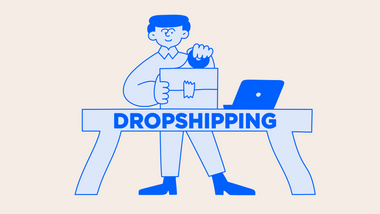What Is Dropshipping in Singapore and How To Get Started?
Learn all about dropshipping in Singapore and how to get started with this popular business model. Discover the benefits, steps, and tips to succeed in this comprehensive guide.

Dropshipping business in Singapore is a streamlined ecommerce model where you sell products without inventory, making it ideal for aspiring entrepreneurs.
If you're based in Singapore and looking to venture into the world of dropshipping, this article will guide you through the process, covering everything from understanding the difference between dropshipping and traditional ecommerce to the key considerations before starting your own dropshipping business. So, let's begin your journey to becoming a successful dropshipper in Singapore.
The Difference Between Dropshipping and Ecommerce
Before diving into the specifics of dropshipping, it's important to understand how it differs from traditional ecommerce. In a typical ecommerce business, you would purchase a large number of products upfront and store them in a warehouse or your own premises. When a customer orders, you package and ship the product directly to the customer. This requires a significant investment, as you need to buy inventory in advance and handle all aspects of order fulfilment.
Dropshipping, on the other hand, flips this model on its head. With dropshipping, you don't need to keep any inventory on hand. Instead, when a customer purchases from your online store, you simply transfer the order and customer details to your dropshipping supplier, who will then fulfil the order on your behalf. They will handle the packaging and shipping, allowing you to focus on marketing and growing your business.
Dropshipping offers several benefits that make it an attractive option for aspiring entrepreneurs and is a popular Singapore ecommerce trend. Firstly, it eliminates the need for upfront investment in inventory. This means you can start your online store with minimal capital and avoid the risk of being left with unsold products. Dropshipping allows you to offer a wide range of products without the hassle of managing a physical inventory. You can easily add new products to your store and test different niches without additional costs.
Another advantage of dropshipping is the flexibility it provides. Since you don't have to handle order fulfilment, you can run your business from anywhere worldwide as long as you have an internet connection. This opens up opportunities for digital nomads and those seeking a location-independent lifestyle.
However, dropshipping also has its drawbacks. One of the main challenges is the lack of control over the shipping process. Since you rely on your dropshipping supplier to handle packaging and shipping, you have limited control over the quality of these aspects. This can potentially lead to delays, damaged products, or poor customer service experiences. Choosing reliable and reputable dropshipping suppliers to mitigate these risks is crucial.
On the other hand, traditional ecommerce allows for greater control over the entire order fulfilment process. You can ensure that products are packaged and shipped to your desired standards, providing a consistent customer experience. Additionally, having inventory on hand allows for faster shipping times, which can be a competitive advantage in the ecommerce landscape.
However, traditional ecommerce also comes with its own set of challenges. The upfront investment in inventory can be a significant barrier to entry, especially for entrepreneurs with limited capital. Managing inventory can also be time-consuming and expensive, as you need to store products, handle fulfilment logistics, and deal with potential stockouts or overstock situations.
Both dropshipping and traditional ecommerce have their pros and cons. Ultimately, the choice between the two depends on your business goals, available resources, and personal preferences.
Key Considerations Before Starting a Dropshipping Business
While dropshipping offers many advantages, it's important to consider a few key factors before diving in headfirst.
Getting Started With Dropshipping in Singapore
Researching profitable product niches and target markets
Choosing the right niche is crucial for dropshipping success. Research and identify profitable niches that have a demand in the Singapore market. Consider factors such as competition level, target audience, and potential profit margins.
Finding suppliers and managing inventory
Find reliable dropshipping suppliers that offer a wide range of products, competitive prices, and excellent customer service. Look for suppliers specialising in serving the Singapore market to ensure faster shipping times and smoother operations. Additionally, focus on managing your inventory efficiently to avoid stockouts or overstocking. Proper inventory management practices will help you maintain a smooth and seamless operation.
Identifying reputable dropshipping suppliers in Singapore
When starting dropshipping in Singapore, it's vital to identify reputable dropshipping suppliers in the country. Look for suppliers with a proven track record of delivering quality products and excellent customer service. Research their reputation, read customer reviews, and consider their shipping options and return policies. Ensure that the suppliers you choose are reliable, responsive, and able to meet your business needs. Building strong partnerships with reputable suppliers will contribute to the success and credibility of your dropshipping business.
Implementing effective inventory management practices
Implementing inventory management practices is crucial for efficient dropshipping operations in Singapore. Utilise inventory management software or tools to track and manage your stock effectively. Monitor product popularity, sales velocity, and lead times to make data-driven decisions regarding stock replenishment. Effective inventory management ensures you can promptly fulfil customer orders and maintain a positive customer experience.
Building and optimising your online store
When starting dropshipping in Singapore, building and optimising your online store is crucial for attracting and retaining customers. Design a user-friendly and visually appealing store interface that is easy to navigate and showcases your products effectively. Consider your store's overall aesthetics, layout, and functionality to create a positive user experience. Optimise your product listings for search engines and conversions by using relevant keywords, compelling descriptions, and high-quality images. A well-designed and optimised online store will enhance your chances of success in the competitive dropshipping landscape.
Designing a user-friendly and visually appealing store interface
To create a positive shopping experience for your customers, focus on designing a user-friendly and visually appealing store interface. Ensure your website is easy to navigate, with clear categories, filters, and search functionalities. Use visually engaging graphics and high-quality product images to capture customers' attention. Consider the overall layout, font choices, and colour schemes to create a cohesive and visually appealing design. By prioritising user experience and aesthetics, you can build trust with your customers and encourage them to purchase.
Optimising product listings for search engines and conversions
Optimising your product listings for search engines and conversions is essential for driving traffic to your online store and increasing sales. Conduct keyword research to identify relevant and popular search terms in Singapore. Incorporate these keywords strategically into your product titles, descriptions, and tags to improve your store's visibility in search engine results. Additionally, craft compelling and persuasive product descriptions that highlight the benefits and features of your products. By optimising your listings, you can attract more potential customers and improve conversion rates.
Streamlining order processing and fulfilment
Streamlining order processing and fulfilment is vital for efficient dropshipping operations in Singapore. Establish efficient systems for order processing and tracking to ensure that orders are fulfilled accurately and promptly. Utilise automation tools or software to streamline the order fulfilment process and reduce manual errors. Implement clear communication channels with your suppliers to facilitate smooth order fulfilment. By streamlining these processes, you can provide a seamless shopping experience for your customers.
Establishing efficient systems for order processing and tracking
To streamline order processing and tracking, it's important to establish efficient systems within your dropshipping business. Thankfully there are accounting services for ecommerce business owners to make this part of business as stress-free as possible. Utilise order management software to automate and track orders from your online store to your suppliers. Set up clear processes for order verification, packing, and shipping to ensure accuracy and efficiency. Regularly monitor and update your order status to provide timely updates to customers. Establishing these efficient systems can improve order accuracy, reduce delays, and enhance customer satisfaction.
Ensuring smooth fulfilment and timely delivery to customers
Smooth fulfilment and timely delivery are essential for customer satisfaction in dropshipping. Work closely with your suppliers to ensure that orders are processed and shipped promptly. Monitor inventory levels to avoid backorders or delays in fulfilling customer orders. Implement reliable shipping methods and provide tracking information to customers, allowing them to monitor their shipments. You can build customer trust and encourage repeat purchases by prioritising smooth fulfilment and timely delivery.
Marketing and promoting your dropshipping business
To succeed in dropshipping in Singapore, effective marketing and promotion are crucial. Develop a comprehensive marketing strategy that includes a mix of digital marketing techniques such as social media marketing, search engine optimisation (SEO), content marketing, and paid advertising. Use social media platforms, influencers, and email marketing to effectively reach your target audience. Tailor your marketing messages to highlight the unique value propositions of your products. Consistent and targeted marketing efforts will help increase brand awareness, attract customers, and drive sales.
Setting up customer service and retention
Setting up excellent customer service is vital for building a loyal customer base and ensuring long-term success in dropshipping. Provide multiple communication channels, such as email and live chat support, to promptly address customer inquiries and concerns. Offer a hassle-free return and refund policy to instil confidence in your customers. Implement strategies to enhance customer satisfaction and retention, such as personalised emails, loyalty programs, and proactive follow-ups. You can build strong customer relationships and foster loyalty by prioritising customer service.
Following legal and compliance considerations
When running a dropshipping business in Singapore, it's important to adhere to legal and compliance considerations to operate legally and protect your business. Register your company with the relevant authorities and obtain the necessary licenses or permits. Familiarise yourself with the local tax regulations and ensure proper tax compliance. Understand and comply with intellectual property and consumer protection laws to avoid legal issues. By following these legal and compliance considerations, you can operate your dropshipping business with peace of mind.
Registering your business and understanding legal obligations
To ensure your dropshipping business in Singapore is legally compliant, register your business with the appropriate authorities. Determine the suitable business structure, such as a sole proprietorship or private limited company, and complete the necessary registration processes. Familiarise yourself with the legal obligations related to business registration, tax payments, and financial reporting. Consult with a legal professional or seek guidance from relevant government agencies to ensure you meet all legal requirements. Operating your dropshipping business within the legal framework is essential for long-term success.
Ensuring compliance with intellectual property and consumer protection laws
Ensure that your products do not infringe on trademarks, copyrights, or patents. Source products from reputable suppliers and verify the authenticity of the brands you are dropshipping. Familiarise yourself with consumer protection laws, including regulations related to product safety, labelling, and warranties. By ensuring compliance with these laws, you protect your customers and your business from potential legal issues.
Scaling your dropshipping business
As your dropshipping business in Singapore grows, it's important to have strategies in place for scaling your business operations. Continuously analyse and optimise your business processes, identify areas for improvement, and implement automation where possible. Seek opportunities to expand your product offerings and target new market segments. Consider collaborating with influencers or partnering with complementary businesses to increase brand exposure. As you scale, monitor your financials, manage cash flow effectively, and invest in marketing and customer retention efforts. With a well-planned scaling strategy, you can achieve long-term growth and profitability.
Conclusion
Starting a dropshipping business in Singapore can be an exciting and rewarding venture. Understanding the unique aspects of dropshipping, conducting thorough research, and taking the necessary steps to set up your online store can pave the way for a successful dropshipping business. Start your dropshipping journey today by getting in touch with one of our experts, who can assist with what you need to keep your accounts in order and your business compliant with local regulations. Your potential for entrepreneurial success in the thriving Singaporean market is close!







